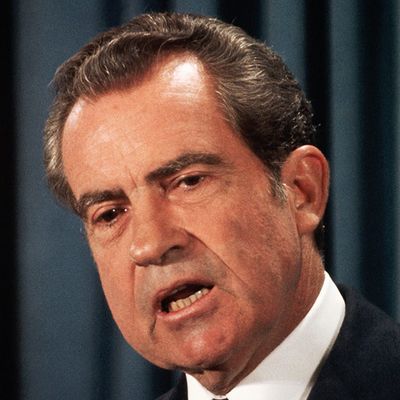
Inevitably, discussions of presidential impeachment are influenced by the rare recent examples of Richard Nixon (who resigned under threat of removal from office just before the House was about to impeach him) and Bill Clinton (impeached by the House but acquitted by the Senate). Some observers look at what happened to Nixon and prophesy that today’s Republicans like yesterday’s will eventually abandon their president in horror over his misconduct. And some look at the Clinton saga and see a sure-to-be-frustrated effort to remove Trump that divides and eventually damages Democrats.
As Gallup’s Jeffrey Jones notes, however, public-opinion dynamics at this point in the impeachment process don’t really resemble those in either of the earlier cases. Reflecting a general trend toward partisan polarization in recent years, Democrats and Republicans are very starkly divided on the prospect of removing Donald Trump from office.
Democrats and Republicans are far more unified in their respective positions about whether or not President Donald Trump should be impeached and removed from office than they were about Richard Nixon at the end of the Watergate scandal.
Eighty-nine percent of Democrats currently say Trump should be impeached and removed from office. That compares with 71% of Democrats who in 1974 said the charges against Nixon warranted his removal from office. The 1974 survey was conducted days before Nixon announced his resignation from office on August 8, 1974.
Among Republicans, 92% reject Trump being impeached and removed from office while just 7% are in favor of it. Under Nixon, a smaller 59% of his fellow Republicans opposed his removal from office while 31% endorsed it.
Though the circumstances were quite different, and overall support for removal of the president from office was lower, partisan polarization during the Clinton impeachment crisis were similar to those seen when Nixon was in the process of going down:
The partisan gap on Clinton’s impeachment was almost the same as it was for Nixon — 43 percentage points. Fifty-eight percent of Republicans and 15% of Democrats favored removing Clinton from the presidency.
The current partisan gap on giving the 45th president the boot is 82 percent. It could get more extreme, but not by much.
Self-identified independents are pretty much where they were when the Tricky One was on the brink of resignation — 53 percent currently favor Trump’s removal while 55 percent wanted to remove Nixon in August of 1974. As a reflection of how weak the case against Clinton was (and was perceive at the time by non-Republicans), only 29 percent of indies wanted to remove him from office in October of 1998, after the Starr Report was released but before formal impeachment proceedings began.
Now a lot has changed in the composition of both major parties since Nixon’s day. For one thing, the Republican Party is far less diverse ideologically than it was in the 1970s, and far more inclined to follow the leaders, and I noted earlier this year:
According to Gallup, Nixon’s job-approval ratings among Republicans fell from 91 percent in February of 1973 to 54 percent by October of that year. There were multiple reasons for that plunge, including, yes, Watergate publicity (punctuated by the Saturday Night Massacre in which Nixon fired his attorney general, his deputy attorney general, and the Watergate special prosecutor), plus the resignation of his vice-president, Spiro Agnew, after being caught accepting bribes; growing public hostility to delays in ending the Vietnam War; and the beginning of a recession that interrupted a long period of economic growth. By the time Nixon was forced to resign, his approval rating overall was a terrible 24 percent, and just 50 percent among Republicans.
Using Gallup figures for Trump, his approval rating among his fellow partisans is at 87 percent, and has never been lower than 77 percent during the course of his presidency.
There’s a stubborn belief out there in the punditocracy that partisan (or ideological) polarization is an elite phenomenon, disguising the desire of regular Americans for come-let-us-reason-together bipartisanship and compromise. If that was ever true, it certainly isn’t right now when it comes to the fate of Donald J. Trump.






























